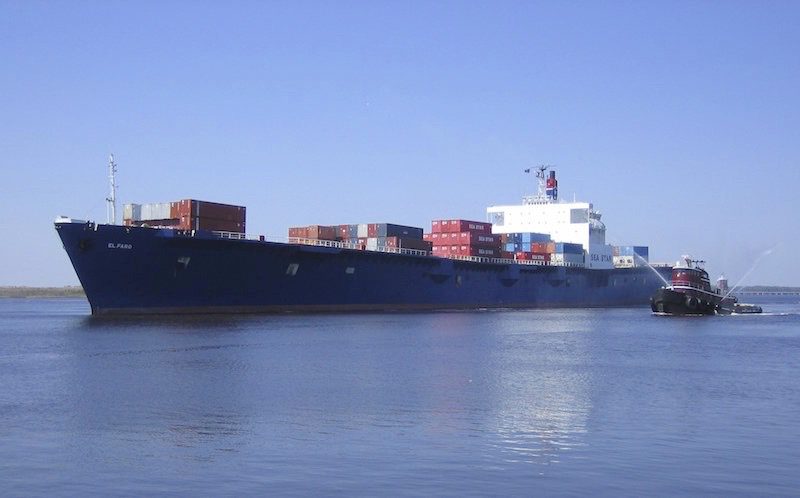SS El Faro. Photo: Tote Maritime
The U.S. House of Representatives this week approved legislation to address maritime transportation safety issues raised by the El Faro sinking, promote the Coast Guard’s awareness of technologies that could help improve Service mission performance, and reduce marine debris.
As approved in the House by voice vote, the Save Our Seas Act (S. 756) combines several pieces of bipartisan legislation recently approved by the Transportation and Infrastructure Committee.
The legislation includes the Save Our Seas Act, the Maritime Safety Act of 2018 (H.R. 6175), and the Coast Guard Blue Technology Center of Expertise Act (H.R. 6206). Each is described below:
- The Save Our Seas Act promotes continued national and international efforts to address the growing amount of marine debris entering the ocean environment. This provision urges the administration to support research and development on systems and materials that would reduce the amount of waste that enters the ocean and work with nations that discharge large amounts of solid waste into the ocean by sharing technologies and infrastructure to prevent, reduce, or mitigate those land-based sources from entering the marine environment.
- The Maritime Safety Act of 2018 (H.R. 6175) addresses maritime safety issues that were raised in the Commandant of the Coast Guard’s final action memo in response to the sinking of the El Faro. This provision of the bill will ensure timely weather forecasts, emergency safety gear with locator beacons, float-free voyage data recorders with integrated emergency position indicating beacons, and other safety improvements.
- More on this: Maritime Safety Act of 2018 Seeks to Implement Lessons Learned from El Faro Tragedy
- The Coast Guard Blue Technology Center of Expertise Act (H.R. 6206) establishes a Blue Technology Center of Expertise to help promote awareness within the Coast Guard of the range and diversity of so-called Blue Technologies – new and emerging maritime domain awareness technologies, especially more cost effective unmanned technologies – and how the use of such technologies could enhance Coast Guard mission readiness and performance. The bill also enables the sharing and dissemination of Blue Technology information between the private sector, academia, nonprofits and the Coast Guard.
“This legislation will help keep our oceans cleaner, keep our mariners safer, and help the Coast Guard to acquire new technologies to meet their mission needs,” said Subcommittee on Coast Guard and Maritime Transportation Chairman Duncan Hunter (R-CA). “It is a true bipartisan effort, and I thank Ranking Member Garamendi for working with me to advance this important maritime legislation.”
“I’m very pleased that Congress has come together in a bipartisan way to pass the Save Our Seas Act, which will help clean up marine debris and address other crucial areas of maritime safety,” said Subcommittee on Coast Guard and Maritime Transportation Ranking Member John Garamendi (D-CA). “Every year, millions of tons of plastics and debris enter the world’s oceans, harming entire ecosystems and threatening the global food supply. This bill will give our Coast Guard greater resources to tackle this growing concern. The bill also addresses crucial maritime safety issues by implementing recommendations made in the wake of the tragic sinking of the El Faro. I’m also especially proud that this bill contains my legislation to establish a Blue Technology Center of Expertise for the Coast Guard, which will promote the use of advanced ocean technologies and facilitate exchanges between the Coast Guard, academia, and the private sector. I’m very grateful for the leadership of Chairmen Hunter and Young, as well as Ranking Members DeFazio and Bonamici, for their bipartisan work in making this very good bill a reality.”
The Save Our Seas Act (S. 756) will now head to the Senate for a vote.

 Join The Club
Join The Club











